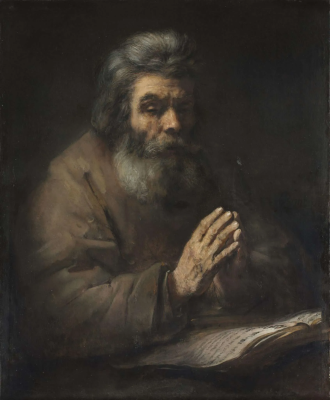Gospel in Art: Beware of practising your righteousness before other people

An Elderly Man in Prayer by a follower of Rembrandt © Cleveland Museum of Art
Source: Christian Art
Gospel of 18 June 2025
Matthew 6:1-6, 16-18
At that time: Jesus said to his disciples: 'Beware of practising your righteousness before other people in order to be seen by them, for then you will have no reward from your Father who is in heaven.
'Thus, when you give to the needy, sound no trumpet before you, as the hypocrites do in the synagogues and in the streets, that they may be praised by others. Truly, I say to you, they have received their reward.
'But when you give to the needy, do not let your left hand know what your right hand is doing, so that your giving may be in secret. And your Father who sees in secret will reward you.
'And when you pray, you must not be like the hypocrites. For they love to stand and pray in the synagogues and at the street corners, that they may be seen by others.
'Truly, I say to you, they have received their reward. But when you pray, go into your room and shut the door and pray to your Father who is in secret. And your Father who sees in secret will reward you.
'And when you fast, do not look gloomy like the hypocrites, for they disfigure their faces that their fasting may be seen by others. Truly, I say to you, they have received their reward. But when you fast, anoint your head and wash your face, that your fasting may not be seen by others but by your Father who is in secret. And your Father who sees in secret will reward you.'
Reflection on the painting
Today's Gospel, often read on Ash Wednesday, serves as a powerful reminder that God sees what is done in secret and rewards the heart, not the performance. Jesus warns against making a public show of our prayer, fasting, or almsgiving in order to win human approval. Instead, He invites us into a spirit of humility and hiddenness: to fast without gloom, to give without fanfare, to pray without display. This is what some have called "desert time", these sacred moments of solitude, away from the noise and affirmation of the world, where the soul can encounter God in truth.
Our painting shows a man in prayer, away from anyone seeing him. He is sitting in solitude, unnoticed by man, but noticed by God. Late in his life, Rembrandt often turned to religious subjects with a deep sense of personal reflection. Our work known as An Elderly Man in Prayer, though once attributed to Rembrandt, shares the spiritual intimacy and contemplative tone found in these late religious compositions. The figure, seated with eyes nearly shut and hands gently clasped in prayer over a large book, evokes a quiet moment in prayer.
However, this painting is no longer believed to be by Rembrandt himself. Art historians now attribute it to a follower or later imitator, likely from the 18th century, based on certain stylistic inconsistencies. These include the broad, flat treatment of the clothing, the less refined modelling of the hands, and the uniform approach to the rendering of hair, all of which depart from the subtlety and technical precision found in Rembrandt's authenticated works.
Jesus' teaching reminds us that the motivation behind our actions matters as much as the actions themselves. Saint Paul echoes this in his words: "If I give away all my possessions, but do not have love, I gain nothing." Even generous deeds, if done for the sake of ego or recognition, lose their spiritual value. Jesus calls us to purity of intention, to give, pray, and fast not for the eyes of others, but for the love of God.
LINKS
Gospel in Art: https://christian.art/
Today's Reflection: https://christian.art/daily-gospel-reading/matthew-6-1-6-16-18-2025-2/ (with audio)


















